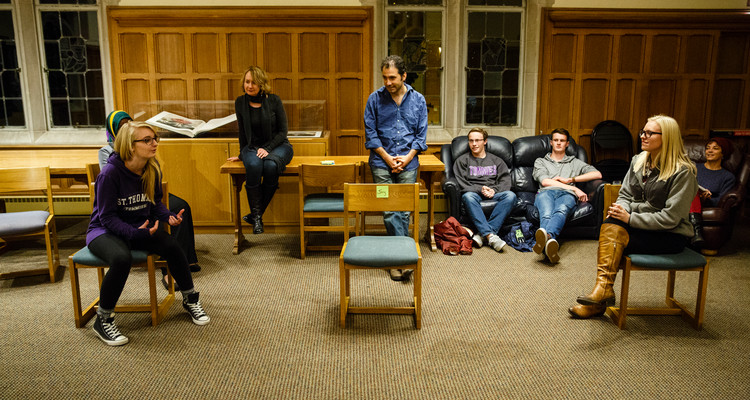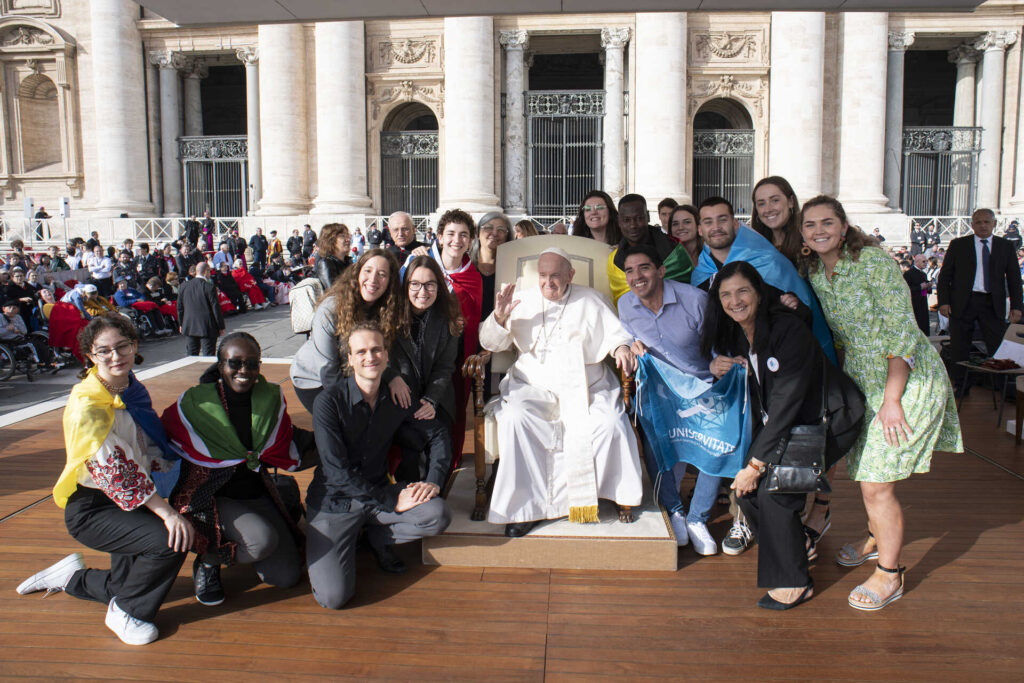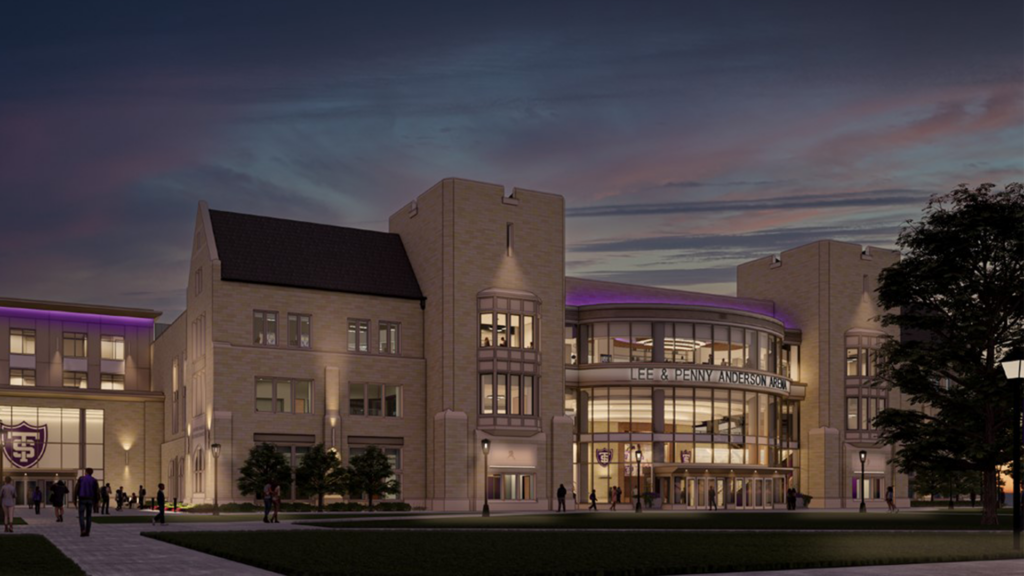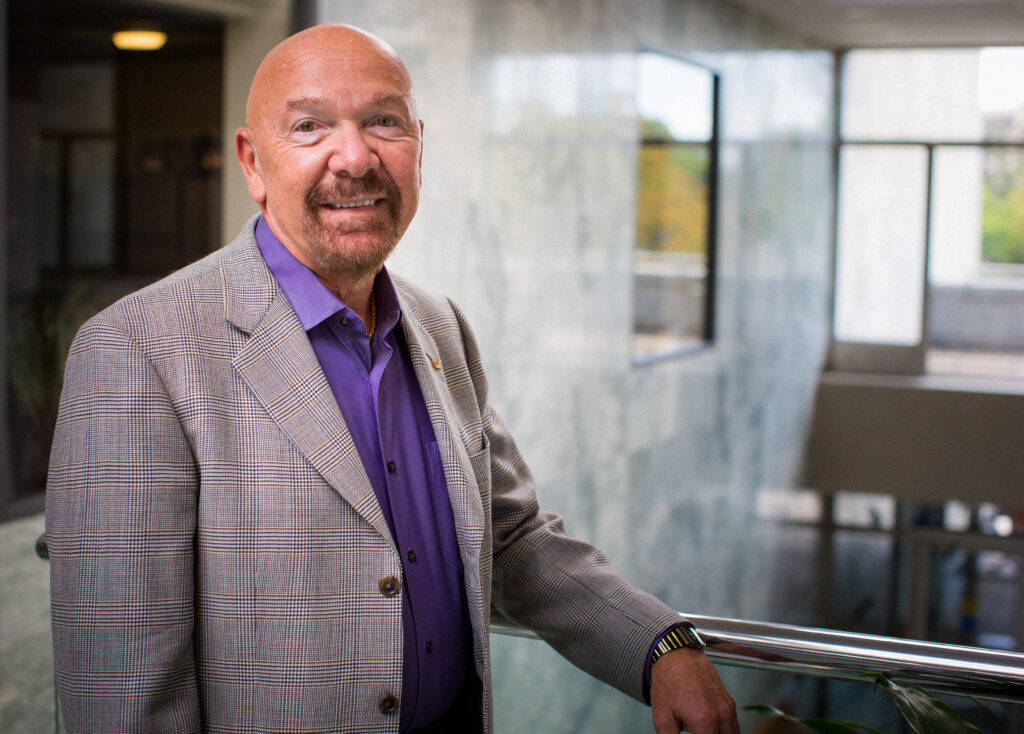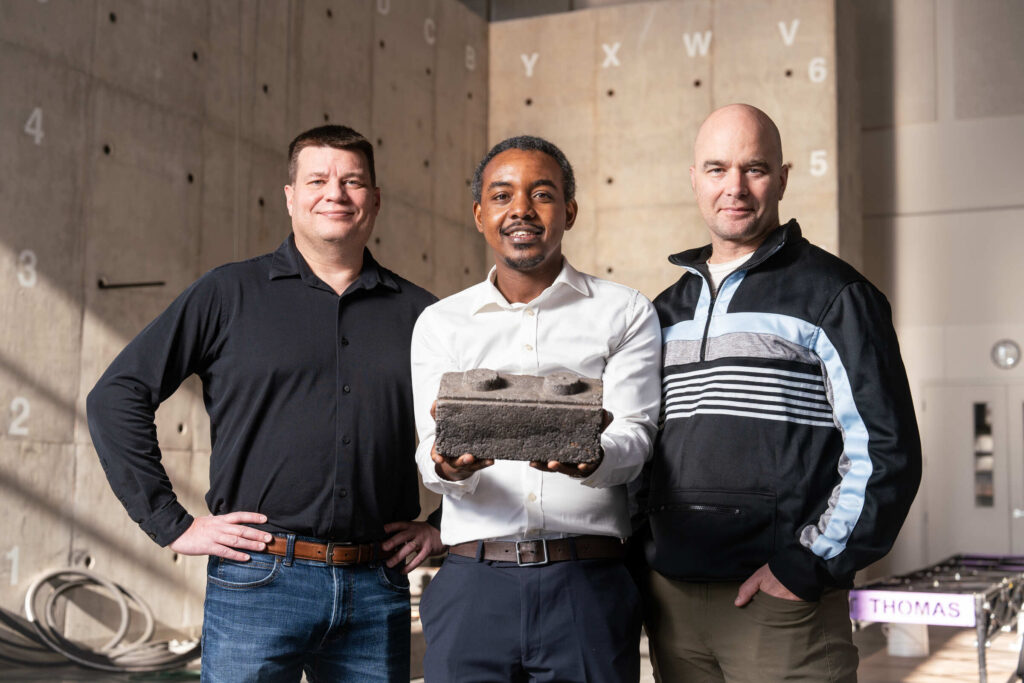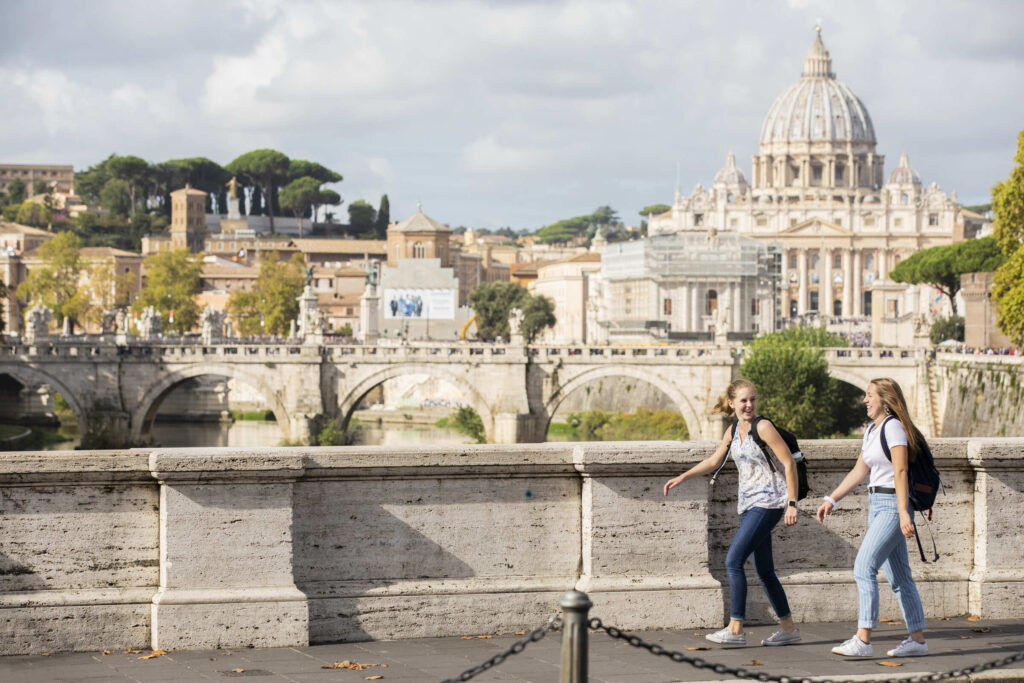Sophomore Annika Wahlquist warms up on a Tuesday night before rehearsal with 11 fellow castmates. They’re in the lower level of downtown St. Paul’s Hamm Building, just down the hall from the stage where they will perform in Park Square Theater’s production of "Six Characters in Search of an Author," which is scheduled to run April 19-May 8. Wahlquist’s long-sleeved purple shirt hints at the St. Thomas influence on the cast, but it takes more than that to understand how intimately tied the university is to this particular community-based theater production.
English Department chair Amy Muse has been the mastermind on campus behind a collaboration with Wonderlust Productions and Park Square Theater, a partnership that started last year and covered both semesters of this academic year. Muse’s name was raised to Alan Berks and Leah Cooper of Wonderlust, who were looking for a collegiate partner for the latest iteration of their community-based artistic work. Muse – who said she is passionate about using theater as pedagogy for deeper learning in classrooms – jumped at the opportunity.
“It has been a fabulous success,” Muse said of the Wonderlust Theater Residency at St. Thomas. “It’s been more deeply collaborative than I realized it could be.”
Tapping into Tommies
Berks and Cooper were looking first and foremost to have conversations with college students that would help inform their adaptation of "Six Characters in Search of an Author," a 1921 play about characters in need of completion to their stories. Wonderlust’s production was looking to bring the play into the 21st century and add all the social media, reality TV and self-narratives that make it up; Berks and Cooper wanted to discuss with college students how they view their realities and how they are shaped in this landscape.
“We had this idea to connect with college students across departments … and get the fresh, specific perspective of being that age with all these issues,” Cooper said. “It gives us a real-life laboratory, in a way, to take the play back apart and discover what’s in it with fresh eyes.”
Muse coordinated the creation of that laboratory at St. Thomas by pulling in fellow faculty members to incorporate Wonderlust into their courses. The result was 11 classes across the College of Arts and Sciences – in English, communication and journalism, theater, psychology, world language, music, film study and family communication – that hosted roundtable discussions with Wonderlust staff. Berks and Cooper used all those discussion to inform the writing of their adaptation, which ended up being influenced both implicitly and explicitly by what Tommies had to say.
“Artistically it has been a really fascinating process how talking to a community can shape, change, improve how we as artists do the play,” Berks said. “This is an experiment in community-driven process that I don’t think anyone has done before. There’s a script, and we’re informing this script with what we’ve heard in the classes. … One of the students literally said, ‘People watch reality television so they don’t have to think.’ Now, one of the characters literally says that. All this material bubbled up.”
Deepening discussions
For the students and faculty contributing their ideas, it also brought a new layer of depth to their learning.
“It was really cool for my students to take an opportunity to connect more personally with our course material, sharing stories about the media’s role in their lives and their relationship with media today,” said Dina Gavrilos, whose COJO Society, Culture and Media class last fall hosted Wonderlust. “[The play is] set in a reality TV show in the 21st century and these characters are asking themselves, ‘What’s real? What are the roles we play?’ This is the subject of the play, and in my class that’s exactly what we’re talking about. We just finished a unit about reality TV shows and the role they play in our culture. … How it’s helping create our reality of who we are and who we should be. It’s very much dovetailing with the themes of this play.”
Many of the discussion topics were personal for students, which, while demanding, opened up different aspects of what they were discovering in class together.
“It’s more personal. You think of class [as] more of an intellectual thing that your heart may or may not be engaged in as much. But it’s like they’re bringing who we actually are to [the play],” said freshman Kateri Schmidt, a student in Muse’s English class The Play’s the Thing. “It’s this whole raw experience you don’t expect in class. You expect this kind of discussion more around your friends or even therapy.”
“It’s very unique and more engaging than a class discussion might usually be,” freshman classmate Autumn Heiderscheit added.
Those takeaways reinforce Muse’s teaching goals of using theater to extend education in non-theater courses and showed off a wide-ranging collaboration across campus.
“It’s a nice mix between freshman courses, core courses, upper-level courses. That was just a perfect, beautiful coincidence we’ve been able to capture such a wide range,” Muse said. “This is not as common as we might think, this kind of partnership across a college, not just a theater department.”
“It was personally inspiring to see creative work being done out there that’s connecting to academic scholarship and these critical perspectives,” Gavrilos said.
Beyond the classroom discussions, St. Thomas students and faculty were also involved in improvisation workshops with professional actors on campus; filming (and appearing in) taped fake reality TV scenes that will be used in the production; and – with Wahlquist – on the stage.
“You can really see now what Alan is talking about with things bubbling to the surface,” Wahlquist said. “We had a version of the script earlier that Alan had written and we read through, and it’s been cool to see how it’s gone from what we read, to what the students have influenced, to bring it to where it is now. To be immersed in that change and going from reading the script to living the script on stage now is great.”
Muse, Gavrilos and Berks also will be on stage following the April 27 production to discuss their collaboration and all the benefits it has had. (Fifty tickets have been reserved for St. Thomas faculty, staff and students at a reduced price of $15 for that night's show, Muse said; Tommies should call the Park Square Theater box office at 651-291-7005 to purchase tickets.)
“I would love to be on a college campus every semester. There’s so much you can get out of it,” Berks said. “We learned from the students, the professors. It was fantastic.”
